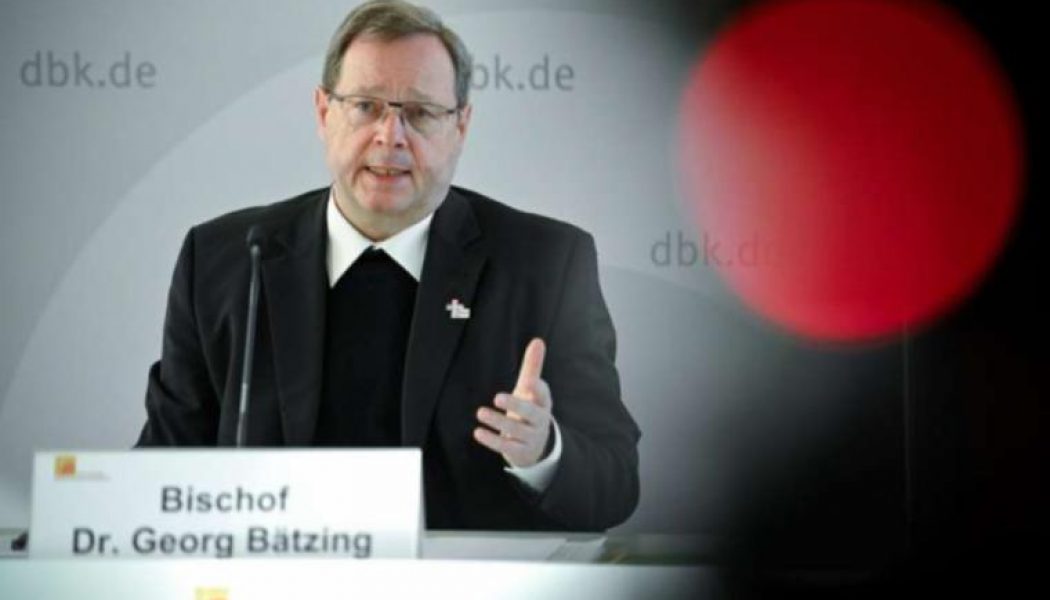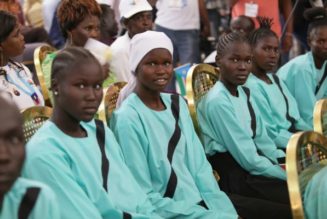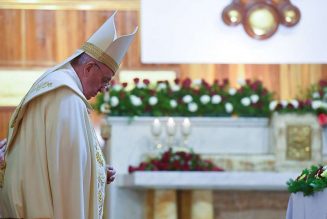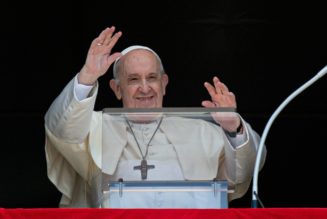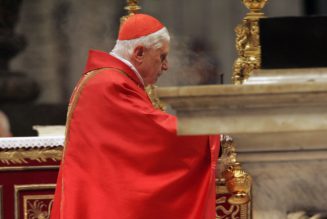
VATICAN CITY — In January, two Vatican cardinals wanted to summon the president of the German bishops’ conference to Rome and correct him about a media interview in which he expressed his dissent from Church teaching in a number of areas.
Such a meeting, which some believe should have been used to give the Vatican’s formal opposition to the Synodal Path, never happened and now the German bishops are blazing ahead unfettered, drawing grave concerns of possible schism.
Jesuit Cardinal Luis Ladaria, prefect of the Congregation for the Doctrine of the Faith, and Cardinal Kurt Koch, the Swiss president of the Pontifical Council for Promoting Christian Unity, were concerned about comments Bishop Georg Bätzing made in a lengthy interview with the German publication Herder Korrespondenz published at the end of December.
Vatican sources told the Register that the interview, in which the bishop questioned established Church teaching, was highly revealing of the bishop’s own dissent from the magisterium, leading the two concerned cardinals to want to ask Bishop Bätzing to come to Rome to correct him.
“Santa Marta said ‘No’,” said one of the sources referring to the Pope’s official residence.
The Register has contacted both cardinals and the Holy See Press Office if they could confirm this version of events but has so far received no response.
The Controversial Interview
In the largely overlooked interview, headlined “I Want Change” and published over the New Year, Bishop Bätzing of Limburg began by describing himself as a “good conservative because I love this Church and gladly give my life and energy to it. But I want it to change.”
He then went on to directly challenge the Church’s teaching and tradition regarding women’s ordination to the priesthood, the blessing of same-sex unions, priestly celibacy and Holy Communion for Protestants.
Limiting ordination to men seemed to him “less and less convincing,” he said, adding that “there are well-developed theological arguments in favor of opening the sacramental ministry to women as well.”
“This is why I often mention the diaconate of women, because I see it as a space for action,” he continued. He added that when it comes to opening up priestly ministry to women, every pope, starting with John Paul II, had “unanimously” answered that question by ruling it out. “Nevertheless,” he said, “it is on the table.”
Bishop Bätzing questioned what he saw as the need to “cling to the current conditions of admission” to the priesthood, saying the Church blocks vocations by “ex-culturating” herself.
And on the much-criticized Synodal Path of the Church in Germany, a two-year program to debate issues of power, sexual morality, priestly life and the role of women in the Church in an effort to ostensibly root out abuse, he said he tried to understand Rome’s reservations about it and sensed “strong pressure on how to keep the universal Church united in the presence of such different cultural characteristics.”
Referring to Pope Francis’ 2019 letter to the Church in Germany, in which the Pope supported the Synodal Path but urged its participants to focus on evangelization, Bishop Bätzing said the “blocks of systematic causes of abuse” hinder evangelization and must be “dissolved” first. He also said he disagreed with parts of the Pope’s letter that distinguished the spiritual path from the democratic one, saying he wanted more democracy in the Catholic Church in order to “understand, and not exclude, the opinions of the other.”
On priestly celibacy, he said he believed the discussion had matured and it was no longer a matter of discernment.
“At a certain point, you have to decide,” the Limburg bishop said, adding that the Pope is “not pope in all matters” and that bishops are “part of the government of the universal Church.”
Regarding the blessing of same-sex unions, Bishop Bätzing said there was a need for solutions, that he believed it necessary to find liturgical answers “without Rome’s approval,” and that he believed “we should change the Catechism in this sense” after “intense discussion.”
Lastly, on ecumenical Eucharistic celebrations, he argued that a document called “Together at the Lord’s Table,” drawn up in 2019 by a German group of Protestant and Catholic theologians in favor of “reciprocal Eucharistic hospitality,” was a “wise step forward” despite the Vatican formally rejecting it.
The ecumenical document, Bishop Bätzing said, was not about a “common celebration” of the Eucharist or intercommunion but rather whether Catholics and Protestants who attend each other’s celebration of the Communion “have good reasons for doing so.” He added the “practice has been around for a long time.”
Cardinal Koch’s Concerns
In March 8 comments to the Register, Cardinal Koch said he shared the concerns of the Congregation for the Doctrine of the Faith, formally expressed in a four-page critique and letter to Bishop Bätzing last September, which stated that doctrinal differences are “still so weighty” that “mutual participation in the Lord’s Supper or the Eucharist” was not possible.
Cardinal Koch, who sources say is deeply concerned by developments in the German Church like many other senior officials in the Vatican and who has been uncharacteristically direct in resisting the recent developments in Germany, also emphasized that he had made his opposition to the ecumenical group’s document known through interviews and a detailed open letter to the director of the Protestant side of the group.
He pointed out that the Vatican is awaiting the response of the German bishops’ conference to the CDF’s letter “before being able to consider whether and what further steps will be necessary.”
Bishop Bätzing said in the Herder Korrespondenz interview that the bishops’ conference would respond to the CDF’s letter and “confront the counter-arguments,” adding that the letter took him by surprise, failed to “appreciate the ecumenical effort” behind the group, and that he felt it was “somewhat cynical” of the Vatican to say: “No, this is not right, work on it again.”
In a March 1 letter to clergy of his diocese, Bishop Bätzing said that they could give Holy Communion to non-Catholic individuals if they requested it after examining their consciences, but there could be “no general, inter-denominational reception of the Eucharist” or “new forms of Eucharistic celebration.”
In other parts of the Herder Korrespondenz interview, Bishop Bätzing said he was “convinced” we are living in a “time window in which we can really change something,” and that “we have to use it.”
Some German Church leaders believe Bishop Bätzing’s advancement of heterodox arguments is occurring partly because, like many other German bishops, he is influenced by the Central Committee of German Catholics (ZdK), the country’s powerful lay organization that is known for its dissenting ideological views and political ties.
“They have the same thinking, the same line,” said Cardinal Gerhard Müller, Cardinal Ladaria’s German predecessor at the Congregation for the Faith, told the Register on March 22. “Does the ZdK’s leadership believe in the God of the Catholic creed? They only have ideas to justify themselves but they don’t speak of the God who revealed Himself, the Lord of history, of Israel and Jesus Christ.”
Stronger Vatican Action Required?
As opposition to Rome continues, as shown most recently in resistance to the CDF’s statement rejecting the blessing of same-sex unions, Cardinals Ladaria and Koch are not alone in their concerns about the direction of the Church in Germany. Pope Francis has registered his criticism, most notably when he voiced “dramatic concern” about developments last year after having received the German apostolic nuncio in private talks.
But some officials in Rome believe that insufficient steps are being taken to prevent a possible formal schism. They contend it would be a grave error if the plan is to allow the Synodal Path to play out to a conclusion, with the likely endorsement of a broad range of dissenting views on key matters, before the Vatican formally intervenes to correct the dissenting direction of the German Church.
“People are very concerned, nobody is enthusiastic about it,” said one Vatican source. “If the German bishops are going to go through with the Synodal Path, there will be schism, and it would be very bad — and not a good tactic — to allow the bishops to proceed and then, at the end, the Vatican says stop.”
Cardinal Müller said he doesn’t “have great hope” in the Vatican taking action “because they’re unable to understand the gravity of the situation.” He compared it to the early stages of the Reformation when the Roman Curia “didn’t take the right measures” because they were involved in politics which they considered “more important than the religious mission of the Church.”
“Now we have a similar problem in that the Vatican is too diplomatic and political and doesn’t theologically analyze the great danger,” he said, adding that the Vatican is nowadays more concerned “about good relations with governments and the United Nations.”
He and others in Rome have also compared the situation to the time of Martin Luther and Pope Leo X. Too preoccupied by political events, Leo failed to view the Lutheran movement with sufficient seriousness and by the time he did take action, Luther had already gained influential and lasting support.
“Pope Leo had a superficial view and he couldn’t understand Luther,” said Cardinal Müller, who wrote a 2017 book on the history of the popes called Der Papst: Sendung und Auftrag (The Pope: Mission and Mandate). “Leo wasn’t a theologian, he didn’t understand what was happening,” he said.
But Cardinal Müller pointed out a “great difference” between that time and now, namely that the issue then was “the sacraments, the authority of the Successors of the Apostles and St. Peter.” Nowadays, he said, “we’re talking about the Protestantization of the Church, but it’s not the Protestantism of the Reformers, rather it’s the Protestantism of liberal theologians who reduce Christianity” only to “certain moral forms, individual or social.”
Join Our Telegram Group : Salvation & Prosperity
